Education Society Vizja - It is the initiative of a community of professionals who have been involved in education for many years. Our idea is to create a coherent and valuable educational path, covering all stages of education – from kindergarten to university.
As a result, we have opened several schools across Warsaw and Poland, which meet the highest educational and organisational standards.
Over 1000 students have graduated from our schools in Warsaw and Gdansk and we currently employ over 130 highly qualified and experienced teachers and educators.
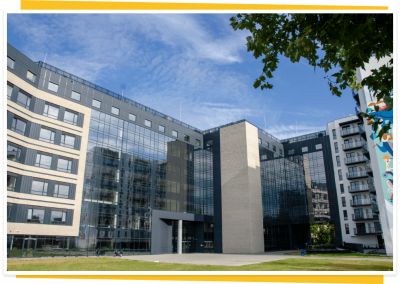
Towarzystwa Edukacyjnego Vizja, founded by the University of Finance and Management in Warsaw, is a community of professionals who have been professionally associated with education for years. It created kindergartens, primary schools and high school in Warsaw and Gdańsk. The TE Vizja High School operates in Warsaw and implements three curricula: the Polish Ministry of Education program with the Polish matura, the British Cambridge IGCSE program, and the IBDP program. On its modern and well-equipped campus, the school offers bilingual education and an extended foreign language program. All students learn two foreign languages. The high school develops soft skills and provides the assistance of a psychologist and school educator.
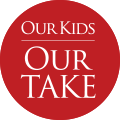

Gallery showcasing specific locations and facilities found at TE Vizja International Schools.




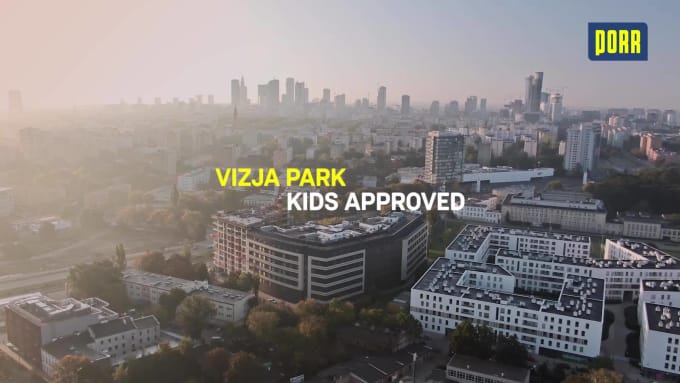







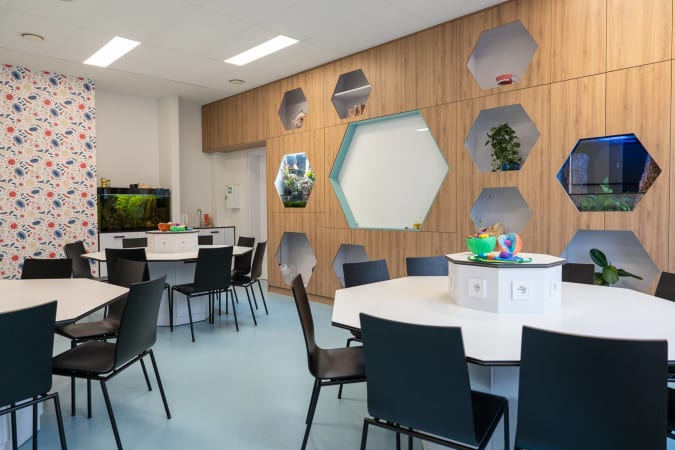
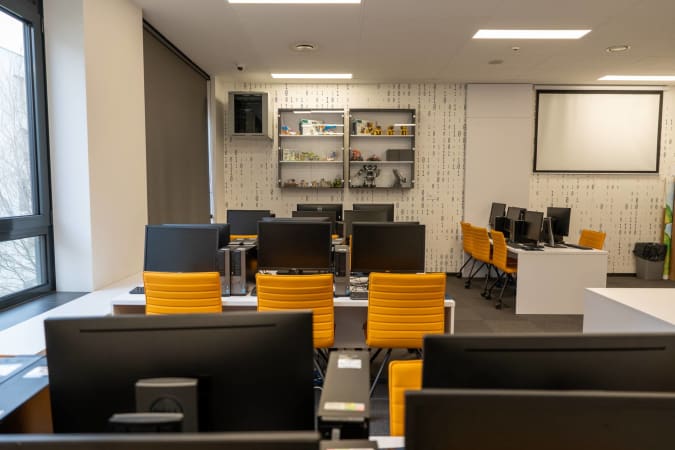
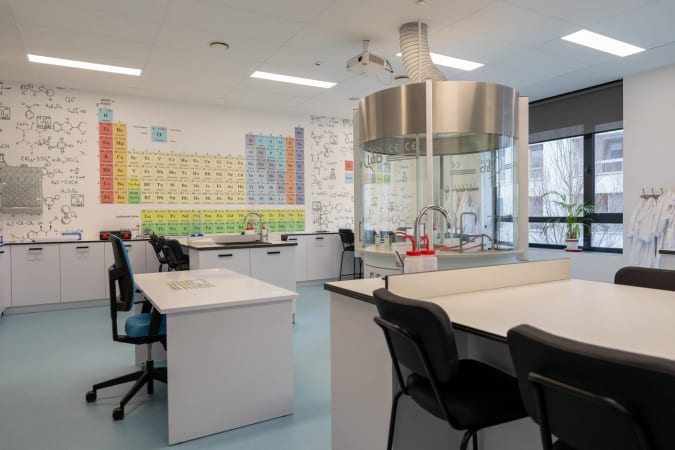




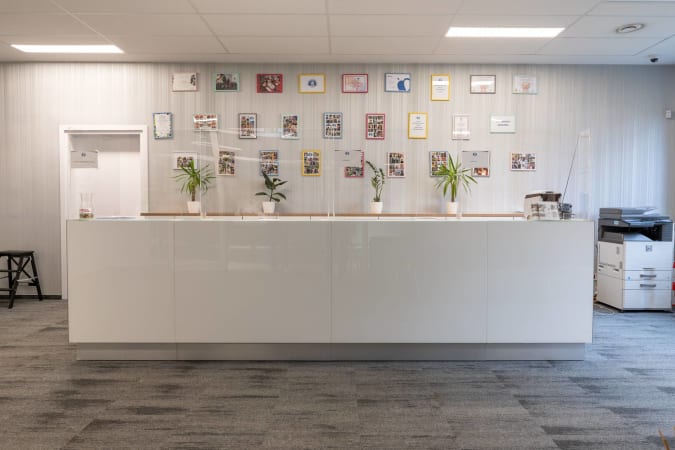





Promotional video for TE Vizja International Schools.
Central to your child's school experience is the underlying curriculum taught in the classroom. "Curriculum" refers to both what is taught and how it's taught. When considering the different curricula outlined in the next few pages, keep in mind that few schools fall neatly into one category or another. Most schools' curricula comprise a blend of best practices drawn from multiple curriculum types. Having said that, most schools do have a general overall curriculum type. These are identified for each school on OurKids.net.
Primary Curriculum: Liberal ArtsSuch an approach to curriculum shares with traditional programs their emphasis on core knowledge-acquisition, but tends to borrow more best practices from the progressive approach. The goal isn't to prepare students for vocational life, but rather to encourage an appreciation of the benefits of education itself, including academic and personal development. There is an emphasis on knowledge acquisition as well as theoretical and academic learning, but the real focus is on cultivating the intellect.
Secondary Curriculum: Academic| Focus |
|---|
| Academic |
| Subject type | offered |
|---|---|
| Learning strategy and study counselling; habit formation | |
| Extra support and minor accommodations for children experiencing subclinical difficulties |
| Subject type | offered |
|---|---|
| Accommodations | |
| Modifications | |
| Extra support |
| Special needs | Accomodations
Formal adjustments are made to the delivery of lessons to help mitigate the learning difficulty or exceptionality. The underlying content and expectations remain unchanged with accommodations, however. (Example: allowing a student to write tests in a quieter room). | Modifications The underlying content and expectations are modified and/or simplified for the sake of the student. (Examples: allowing student to use a calculator on a test when other students can’t; allowing students to bring word-banks or “cheat sheets” into certain tests, etc) | Remediation Research-based therapeutic measures that target and ameliorate the underlying weakness. |
|---|---|---|---|
| Learning disabilities | |||
| ADHD (moderate to severe) | |||
| Dyslexia (Language-Based Learning Disability) | |||
| Auditory Processing Disorder (APD) | |||
| Dyscalculia | |||
| Dysgraphia | |||
| Language Processing Disorder | |||
| Nonverbal Learning Disorders (NLD) | |||
| Visual Perceptual/Visual Motor Deficit | |||
| Developmental | |||
| Autism | |||
| Asperger's Syndrome | |||
| Down syndrome | |||
| Intellectual disability | |||
| Behavioral and Emotional | |||
| Troubled behaviour / troubled teens | |||
| Clinical Depression | |||
| Suicidal thoughts | |||
| Drug and alcohol abuse | |||
| Oppositional Defiant Disorder (ODD) | |||
| Physical | |||
| Dyspraxia (Developmental Coordination Disorder) | |||
| Blindness | |||
| Deafness | |||
| Cystic Fibrosis | |||
| Multiple physical |
| Program | offered |
|---|---|
| Full-time gifted program (parallel to rest of school) | |
| Part-time gifted program (pull-out; parallel to rest of class) |
Curriculum delivery: Enrichment (The main focus is on enrichment. This means that while students may work at a marginally quicker pace than public school peers, the primary aim is to study subject in broader and deeper ways.)
| Program | offered |
|---|---|
| Custom subject enrichment (special arrangement) | |
| Custom curriculum compacting (special arrangement) | |
| Guided independent study (custom gifted arrangement) | |
| Cyber-learning opportunities (custom gifted arrangement) | |
| Formalized peer coaching opportunities (specifically for gifted learners to coach others) | |
| Custom subject acceleration (special arrangement) | |
| Career exploration (custom gifted arrangement) | |
| Project-based learning (custom gifted arrangement) | |
| Mentorships (custom gifted arrangement) |
In grade Gr. 12, TE Vizja Schools students perform an average of 45 mins of homework per night.
| PS | 0 | 1 | 2 | 3 | 4 | 5 | 6 | 7 | 8 | 9 | 10 | 11 | 12 | |
|---|---|---|---|---|---|---|---|---|---|---|---|---|---|---|
| TE Vizja Schools | 0 mins | 0 mins | 15 mins | 15 mins | 30 mins | 30 mins | 30 mins | 30 mins | 45 mins | 45 mins | 30 mins | 30 mins | 45 mins | 45 mins |
| Site Average | 2 mins | 8 mins | 16 mins | 16 mins | 23 mins | 29 mins | 34 mins | 39 mins | 51 mins | 52 mins | 71 mins | 75 mins | 104 mins | 112 mins |
| Sports Offered | Competitive | Recreational |
|---|---|---|
| Football | ||
| Running | ||
| Basketball | ||
| Gymnastics | ||
| Martial Arts | ||
| Swimming |
| Clubs Offered |
|---|
| Foreign Language Club |
| Ballet and Classical Ballet |
| Online Magazine |
| Robotics club |
| School newspaper |
| Student Council |
| Yearbook |
| English Club |
| Audiovisual Club |
| Choir |
| Community Service |
| Grade | 1 | 2 | 3 | 4 | 5 | 6 | 7 | 8 |
|---|---|---|---|---|---|---|---|---|
| Day | zł2,300 / month | zł2,500 / month | ||||||
This information is not currently available.
| Grades | Enrollment |
|---|---|
| PS/Kindergarten (2,5 years) to Gr. 12 | 550 |
| % of foreign students | 10% |
| # of nationalities attending school | 7 |
| PS | 0 | 1 | 2 | 3 | 4 | 5 | 6 | 7 | 8 | 9 | 10 | 11 | 12 | |
|---|---|---|---|---|---|---|---|---|---|---|---|---|---|---|
| Class Size | 25 | 20 | 22 | 22 | 22 | 22 | 22 | 22 | 22 | 22 | 22 | 22 | 22 | 22 |
| Services | Offered |
|---|---|
| Career planning | |
| Internships | |
| Mentorship Program | |
| University counseling |
| Key Numbers | |
|---|---|
| Average graduating class size | 50 |